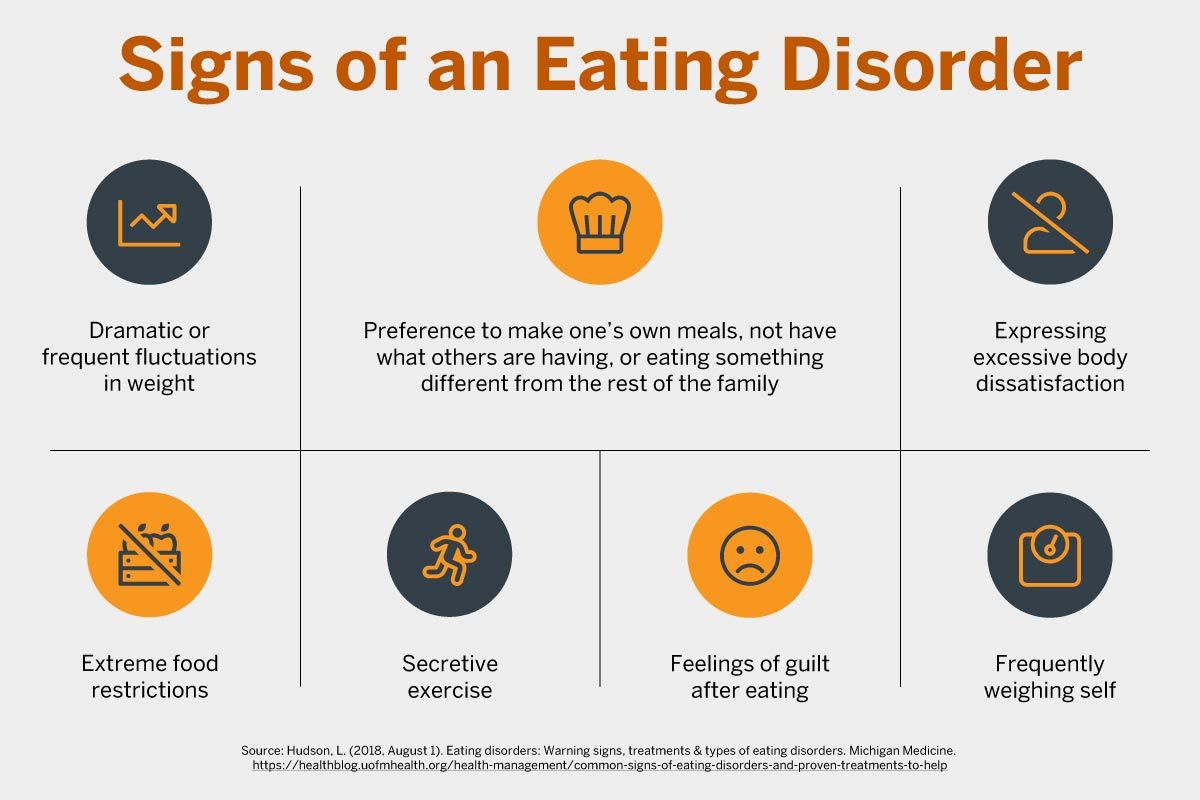Understanding Eating Disorders: Free E-Mental Health Resources to Help

Over 30 million people in the U.S. suffer from eating disorders (ED), and COVID-19 has produced substantial challenges for those in recovery. In a study by the International Journal of Eating Disorders, researchers discovered that symptoms of adults ranging from 16 to over 60 years old have worsened since the pandemic began. Sixty-two percent of respondents with anorexia and 30% of those with bulimia and binge-eating disorders said they had experienced more severe food patterns during the pandemic, and there has been a “sharp increase” in the number of children requiring treatment, according to Eating Recovery Center.
The New York Times reports that eating disorders in teens have “exploded” during the pandemic. Unfortunately, due to increased demand, those seeking treatment for eating disorders face months-long wait times. To help bridge this gap and remove existing barriers to finding treatment for these disorders, we will offer a list of free eating disorder services and electronic mental health interventions that readers can begin using immediately.
Jump to resources:
- Managing Eating Disorders
- Understanding Different Types of Eating Disorders
- Outlining the Signs and Symptoms of Eating Disorders
- Children and Teens With Eating Disorders
- Helping Others With an Eating Disorder
- Eating Disorder Podcasts
- Immediate Help
In order to help you understand if you or someone you know may be suffering from an eating disorder, the University of Michigan provides the following signs:

The Rise of Eating Disorders
The National Institute of Health considers eating disorders to be serious medical conditions. These disorders can affect anyone at any age, regardless of gender, race, weight, or weight goals. For many, the act of eating is a coping mechanism or a way of controlling stress. With that said, it’s understandable that symptoms of eating disorders have worsened as a result of pandemic stress, as reported by an International Journal of Eating Disorders survey. More than half of respondents with eating disorders reported more severe symptoms since the start of the outbreak.
The Center for Excellence in Eating Disorders at UNC-Chapel Hill has provided further evidence of this surge. During an interview with MedPage Today, associate professor Christine Peat revealed that their clinic’s referrals have increased by 30% to 40%. Furthermore, the Center’s founding director stated that they “simply cannot provide adequate services at this point because demand for treatment is so high.”
Indeed, those with eating disorders have struggled with additional challenges during the pandemic, but it has also been difficult to find the right kind of treatment. A new study finds that e-mental health inventions are a promising approach. These interventions come in the form of mobile-app-based resources such as meal logging diaries, mindfulness apps, virtual therapy apps, and more. Readers can access these e-mental health resources below to help with eating disorder management as they pursue professional treatment.
E-Mental Health Resources and Apps for Eating Disorder Management
Free Resources and Apps to Help With Bulimia, Anorexia, or Avoidant Restrictive Food Intake Disorder (ARFID)
- Record Recovery: This app is a smart companion for a user’s journey to recovery from eating disorders including anorexia nervosa, bulimia nervosa, binge eating disorder, and ARFID.
- Rise Up + Recover: Based on self-monitoring homework, a cornerstone of cognitive-behavioral therapy (CBT), this app is designed to be used in addition to professional treatment.
- Nourishly: This app was built with input from leading dietitians, psychologists, and researchers to bring together tools to help manage eating disorders.
- Eating Disorder Test: This app can help users evaluate the risk of eating disorders with a 26-question screening test.
- Brighter Bite — Eating Disorder Recovery: Brighter Bite is described as a knowledgeable, resourceful, and caring buddy to help users navigate through eating disorder recovery.
- Eating Disorder Support: This app enables people with eating disorders, and the people close to them, to find useful information, self-care tips, and links to support them — all in one place.
- Ate Food Journey + Habit Journal: This app is described as a judgement-free, mindful food diary that is thoughtfully designed to help increase self-awareness of eating habits, behaviors, and feelings.
- Overeaters Anonymous Toolkit: This interactive tool is designed to help members of Overeaters Anonymous (OA) work the steps while on the go.
- Overeaters Anonymous Podcasts and Videos: This application offers a large collection of free overeating recovery audios, audio files, and speaker tapes.
Free Resources for Understanding Different Types of Eating Disorders
- Eating Disorders (Medline Plus): This page provides an overview of three major types of eating disorders, along with related research and resources.
- Information by Eating Disorder (NEDA): The page provides information about 11 different eating disorders; readers can click through for detailed information about each disorder.
- Common Types of Eating Disorders Observed in the Elderly Population (Eating Disorder Hope): Explore information about the physical and behavioral effects of eating disorders specific to older adults.
- How to Tell Someone You Have an Eating Disorder: Learn what advice and support is available for deciding how and with whom to talk about an eating disorder, including discussion starters and how to establish a safe environment.
- Eating Disorders in Men and Boys (NEDA): Find information about eating disorders and recovery that are specifically for men, including body image concerns, masculinity, and underrepresentation among those who have an eating disorder.
Free Resources Outlining the Signs and Symptoms of Eating Disorders
- Warning Signs and Symptoms (NEDA): Explore videos, as well as a comprehensive list of emotional, behavioral, and physical symptoms associated with 10 different types of eating disorders.
- The SCOFF Questionnaire (British Medical Journal): This resource provides an explanation of (and instructions for using) the SCOFF screening tool to identify a potential eating disorder.
- Eating Attitudes Test (Psychology Tools): This self-administered screening test consists of 26 questions that can help identify a need for professional attention.
- 7 Signs You Might Have an Eating Disorder: This article discusses the types of eating disorders and the signs someone might require professional assistance.
- Relapse Warning Signs (Mirror Mirror): Explore a list of 19 different signs that a person in recovery from an eating disorder might be relapsing or about to relapse.
Resources and Apps to Help Children and Teens With Eating Disorders
- Does My Child Have an Eating Disorder Quiz: This quiz is designed to help parents determine if their child may have an eating disorder.
- How to Tell if Your Child Has an Eating Disorder: By identifying the signs and symptoms of an eating disorder, this Priory Group article can assist parents in determining whether their children are suffering from one.
- 10 Statistics of Teenage Eating Disorders: Polaris Teen Center presents ten statistics about teenage eating disorders to help parents raise their awareness.
- Teen Eating Disorders: Tips to Protect Your Teen: In this article by the Mayo Clinic, a number of tips are provided to parents to help their teens with eating disorders.
- For Parents: Eating Disorders in Teens: This resource provides general information regarding common eating disorders affecting teenagers.
- Parents Survive to Thrive Guide: This is a resource guide for parents of a child with an eating disorder. It was written by parents who lived through the experience.
- Parent Toolkit by NEDA: The National Eating Disorder Association has developed a downloadable toolkit in order to provide helpful information for parents of children and teens with eating disorders.
- FAQ for Parents Helping a Son or Daughter With an Eating Disorder: The Anorexia Family offers answers to frequently asked questions for parents who have children with eating disorders.
- Disordered Eating: A Guide for Parents and Youth: This downloadable PDF is designed to help parents of children with disordered eating.
- How to Talk To Your Teen About Eating Disorders: The Healthline article provides parents with tips for talking to their teens about eating disorders.
Resources for Helping Others With an Eating Disorder
- Helping Someone With an Eating Disorder: This article aims to provide readers with tools to help friends or loved ones who suffer from an eating disorder.
- 5 Tips On How to Support Someone With An Eating Disorder: This resource contains a list of tips for supporting someone with an eating disorder.
- Supporting Someone With an ED: What to Say and Do: The National Eating Disorder Association shares a list of tips for supporting someone with an eating disorder.
- Tips for Helping a Friend Struggling with an Eating Disorder: This article shares a list of tips for helping a friend struggling with an eating disorder.
- 9 Ways to Help a Friend With an Eating Disorder This resource from Health.com provides nine ways to help someone with an eating disorder.
- How to Help Someone With Anorexia: This article provides advice for helping someone with anorexia nervosa.
- How to Support Someone With Binge Eating Disorder: The Eating Recovery Center shares tips for supporting someone with binge eating disorder.
- 5 Ways To Be An Ally To Someone With An Eating Disorder: This resource provides advice on how to be a supportive ally to someone suffering from an eating disorder.
- Ways to Help Your Friend in Anorexia Recovery: This article by Eating Disorder Hope offers strategies for helping a friend in anorexia recovery.
- I Think My Friend May Have an Eating Disorder. What Should I Do?: Explore tips on how to support a friend with an eating disorder.
Eating Disorder Podcasts
- The Eating Disorder Recovery Podcast: In this podcast, hosts discuss the psychology of eating disorders, body image, and recovery processes for a variety of eating disorder diagnoses.
- The Recovery Warrior Show┃Recovery Warriors: This podcast provides support and inspiration to people who are recovering from an eating disorder.
- ED Matters Podcast: This is a weekly podcast that covers timely topics for people in different age groups and sexual minorities, and also includes recovery while social distancing.
Resources and Warmlines for Immediate Help
- NEDA Helpline: Contact the NEDA Helpline for support, resources, and treatment options for yourself or a loved one who is struggling with an eating disorder.
- ANAD Helpline: ANAD’s free eating disorders helpline is available to provide emotional support and referrals.
- The National Alliance on Mental Illness (NAMI) HelpLine: Callers can talk with helpline volunteers who are available to answer questions, offer support, and provide practical next steps.
- National Suicide Prevention Lifeline: The lifeline provides 24/7, free and confidential support for people in distress, prevention and crisis resources for you or your loved ones, and best practices for professionals.
- The Substance Abuse and Mental Health Services Administration (SAMHSA) National Helpline: SAMHSA’s National Helpline is a free, confidential, 24/7, 365-day-a-year treatment referral and information service (in English and Spanish) for individuals and families facing mental health and/or substance use disorders.
- 7 Cups of Tea: This is an anonymous, free platform to speak with volunteer listeners available 24/7 to give emotional support over online chat.
- Crisis Text Line: This is a free 24/7 text line for anyone to anonymously speak to a trained professional about mental health concerns.
Disclaimer:
The inclusion of these resources is for educational purposes only and does not constitute an endorsement by UT Austin Boot Camps. Furthermore, the health tools provided are not intended to be a substitute for professional medical advice, diagnosis, or treatment, and should not be used as such. If you or a loved one are showing potential signs of an eating disorder, please contact your healthcare provider.

 Live Chat
Live Chat